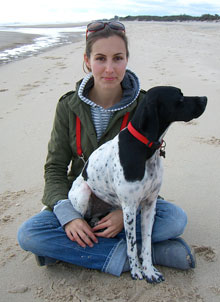I hit ‘send’ with trepidation when I replied to Justine van der Leun‘s  literary agent agreeing to review Marcus of Umbria: What an Italian Dog Taught an American Girl about Love. The book was released when we were in Peru so I didn’t know what it was about except for the tantalizing subtitle.
literary agent agreeing to review Marcus of Umbria: What an Italian Dog Taught an American Girl about Love. The book was released when we were in Peru so I didn’t know what it was about except for the tantalizing subtitle.
A stack of dog books stares at me nightly when I crawl into bed. I have not cracked any of them because I know the dog dies. “Well, dogs do die,” my friend sagely reminded me. “Yes I know! But, why do people wait until their dogs are dead before writing books about them?” From the time I was a child, my dogs’ deaths—even the ones who lived to a ripe old age—threw me into a tailspin of grief. Reading about beloved dogs dying just brings it up all over again. Except for being with my friends when their pets die, and, of course, my own dogs—I avoid dead dogs.
So I was heartened to find this lovely picture on the dust jacket of  Justine and Marcus, an English pointer, posing on a beach. There are no beaches in Umbria. This looks like a New England beach. I concluded the book was safe to read.
Justine and Marcus, an English pointer, posing on a beach. There are no beaches in Umbria. This looks like a New England beach. I concluded the book was safe to read.
Indeed it was. I finished it in one sitting with one interruption to take Sadie to Boulder Reservoir for a round of swim and fetch. Justine’s engaging and witty writing drew me in and her story held me spellbound. Think about it. A young woman gives up her life in New York City lock, stock, and barrel to move in with an Italian gardner, Emanuele Cruciani—and by fiat, his entire Italian family—that she met on a previous vacation, who lives in a 200 person sheep-farming village in Umbria, and barely speaks English!
Justine introduces us to Marcus, in the first sentence of the book. Marcus is manifesting her (Yes, Marcus is a female.) inner bird dog having just snagged a neighbor’s chicken, an act for which Justine knows Marcus could pay the ultimate price. Then Marcus enticingly disappears for several chapters. Marcus come back!
Stumbling over gender role expectations, notions about family, and language barriers make for comic cross-culture clashes. But, it’s when Justine insists on rescuing Marcus from her dire plight that her sensibilities about animals, and Marcus in particular, crash time and again into those of the Crucianis.
Dogs serve a purpose in relatively poor rural Italy. They’re considered useful for herding or hunting, as Marcus was intended to be. They are not members of the family. They aren’t allowed in the house. They’re thought to be dirty. Their lives are cheap. Given the economic and cultural context, as Justine explains, all that makes some sort of sense.
That said, an impassioned discussion ensues when Justine casually mentions that Marcus should be spayed. The Crucianis are unanimous. “‘Your dog must make love to have a full life!’ Fabio (Emanuele’s father) said. …’Un cane deve fare l’amore,’ the others echoed.”
Despite their puzzlement, bemusement, and sometimes consternation, the Crucianis take Justine under their wing as Justine takes Marcus under hers to nurse and love her back to health.
Marcus of Umbria is a heartfelt, rollicking ride. It’s a dog lover’s book. I have only one minor complaint. I want more Marcus!
Visit on Wednesday when I’ll post about my interview with Justine and you can enter a Giveaway for a copy of Marcus of Umbria.










[…] This post was mentioned on Twitter by Rod Burkert, Kim Clune. Kim Clune said: Checking out: This Time the Dog Doesn’t Die http://bit.ly/bRP2F5 (via @boulderdog1) […]